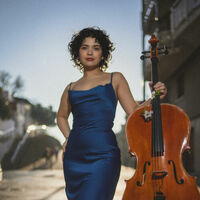̈ I invite you to an imaginary travel to Latin America ̈
Caribe is the third album by Cuban cellist and composer Ana Carla Maza. It is a continuation of her love letter to Latin American music from her previous album, Bahia. Released in 2022, Bahia was followed by a tour of 150 concerts in 14 countries. During her travels, Ana Carla Maza, who is not afraid to take risks, transformed the intimacy of the cello into a vibrant and energetic Latin-jazz sextet.
Although Ana Carla has a classical background, she explores the Caribbean and beyond (Argentina, Brazil) while taking liberties. Her first liberty is to impose her sensitivity and her voice as a woman. "I composed Caribe while traveling the world. In a studio in Rome, on the shores of Lake Annecy, in a castle in Portugal, on a plane trip to Mexico... It was a kind of search for my identity, which started in Guanabacoa, the neighborhood of Havana where I grew up with my grandparents and which happens to be the epicenter of the "rumberos," the percussionists from the pure Afro- Caribbean tradition."
Ana Carla has two mantras: living in the present and living as a free woman. For the first one, the musician chose the whirlwind of Latin jazz - music to dance to, love melodies - played in thirteen brass-filled tracks that feature Cumbia, samba, Tango, Rumba, and Salsa. She expressed the second precept through thirteen tracks, including "Diana" ("Don't be afraid, it's your life, you have nothing to lose"), which she proposed as the closing song. With energy and feminism, the young musician vetoed the usual framework, which requires calling in a male arranger and producer to complete a project.
"In Latin music, women sing, and men do everything else. I decided to do without a music producer. I arrived in the studio with all the scores, written for a sextet, instrument by instrument. I have a classical background, I can play Brahms or Shostakovich, who are complicated. So why not take on a new challenge: entirely produce a colorful Latin album that reflects my feminine sensitivity, my desire for positive celebration of the here and now, of 'alegria', spontaneous joy." Trained in piano in Cuba by Miriam Valdes, sister of Chucho Valdes, daughter of multi-instrumentalist and Chilean Carlos Maza, Ana Carla chose musicians who reflect diversity: a Guadeloupean, drummer Arnauld Dolmen, two Cubans, percussionist Luis Guerra and saxophonist/flutist Irving Acao, a German who loves Honduras on piano, a Frenchman from the south, Norman Peplow, also on piano, Fidel Fourneyron on trombone, and Noé Clerc on accordion. And of course, Ana Carla on cello, precise, virtuosic, and with vocals.
"The cello is the bass, the earth. I use it as a soloist, especially for Astor Piazzola's tango, always acoustically, in all its splendor. The voice represents the body. By singing, we overcome fear, we dance, we celebrate life, we learn, we fall in love." Music can be a succession of small miracles, a sequence of inventions that oppose the worst, sadness, and despair. "In Cuba, when there was a power outage, we would take a piece of cotton, palm oil, make a candle, and it was beautiful, intense, and calm."

